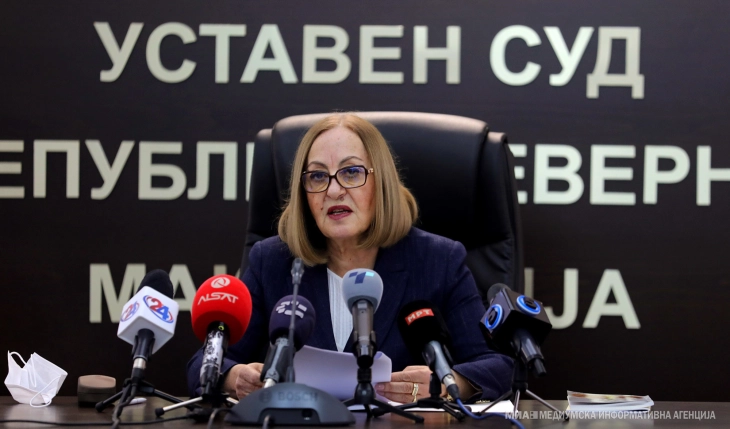Justice will always be an imperative, says Constitutional Court President ending 3-year term
- An act regulating the work of the Constitutional Court and the way the citizens can reach the institution, increased budget, cutting down backlog, full capacity of the Constitutional Court and increased transparency are some of the highlights of named by the Constitutional Court President Dobrila Kacarska of her three-year term.

Skopje, 29 May 2024 (MIA) – An act regulating the work of the Constitutional Court and the way the citizens can reach the institution, increased budget, cutting down backlog, full capacity of the Constitutional Court and increased transparency are some of the highlights of named by the Constitutional Court President Dobrila Kacarska of her three-year term.
At a news conference Wednesday at the Constitutional Court she gave a rundown of her duties and activities during her term. Its focus was on the act regulating the work of the Constitutional Court and the way the citizens can reach it.
The numerous changes allowed by the act include the possibility of the Court for the first time ever to allow legal entities and foreign nationals to file a request and seek protection of their liberties and rights and the possibility allowing the Ombudsman to file requests for protection of the liberties and rights on behalf of those unable to do it themselves.
Also, the Constitutional Court’s new act offers so called controlled mechanisms for judges and presidents preventing them from keeping cases “in the drawer” for years. “Judges have at least six months to hand over an abstract and close the case. More importantly, once presidents of the Constitutional Court receive the finished cases, they cannot keep them longer than a month,” she said.
Kavarska noted that the deadline to respond to the initiators of the act after being asked for an opinion during the proceedings was shortened – instead of 30 days, they will have to respond in 15 days the most after a request of the Constitutional Court.
Namely, if the Court sees that a vacuum could be created with annulment, during which period the citizens or legal entities cannot exercise their rights, the Constitutional Court will contact the initiators of the act and give them a period of at least six months to make corrections. This has been introduced by the constitutional courts in many countries, including Slovenia and Germany, according to her.
Kacarska told the news conference that backlog has been reduced after some cases had been kept open for years.
“Our statistics show that there is a rise in cancelled or annulled acts. In the past, it was rare to decide to cancel or annul. This mandate, there were 78 decisions cancelling laws and other acts and 6 decisions annulling laws. The laws or acts were passed by different parliaments, which suggests that this Constitutional Court acted in an unbiased way,” she said.
At the moment, Kacarska said, the court is at full capacity with nine judges, including Naser Ajdari, Osmani Kadiu, Darko Kostadinovski, Fatmir Skender, Tatjana Vasikj Bozadzieva, Elizabeta Dukovska, Jadranka Dabovikj Anastasovska, and Ana Pavlovska Daneva.
On the financial independence of the Constitutional Court, she said that its budget has doubled, contributing to improving the working conditions. “In comparison, from almost 40 million denars in 2020, the Constitutional Court’s budget is 74 million in 2024,” said the outgoing president.
Furthermore, the Constitutional Court for the first time set up a classified information office, although it was an obligation for almost 15 years, she said.
According to her, the Constitutional Court is now an efficient institution working on cases and holding sessions. “In 2023 alone, a record 46 sessions were held even though the Court didn’t have enough judges, which wasn’t the cases since the establishment of the institution,” Kacarska stated.
Also, the Constitutional Court has increased its transparency according to the program and strategic plan on transparency, she said mentioning that a high 98 percent of 90 journalists covering its work said they were satisfied with the court’s PR team.
She also mentioned that the Constitutional Court in 2023 became one of the founders of the Balkan Forum of Constitutional Courts. As regards international cooperation, the Court established professional cooperation with the Constitutional Court of Bulgaria after signing a memorandum.
“We strengthened our cooperation with the OSCE Mission, which recognized the importance and role of the Constitutional Court in the legal order. We launched cooperation with the IPA program that will take place in the next two years. We enhanced the cooperation with the German foundation IRZ and with their support, we put back the focus on the importance of introducing constitutional litigation in the Republic of North Macedonia,” Kacarska said.
“I’m concluding my term with a sense of completion, being guided by the idea that justice will always be an imperative,” she stressed thanking her colleagues and the citizens who believed in the capacity and independence of the Constitutional Court.
Dobrila Kacarska’s term as Constitutional Court President ends on June 2. One of the court judges will be elected as her successor on May 30.
Photo/video: MIA







